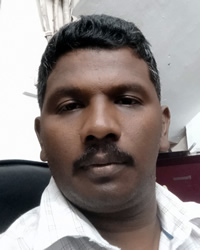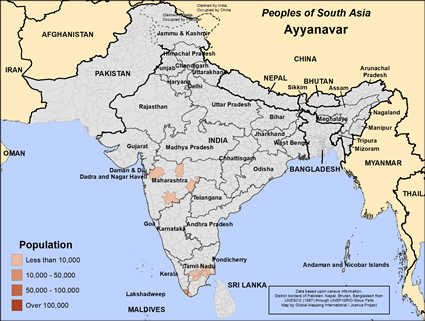Ayyanavar in India

Photo Source:
Anonymous
|

Map Source:
People Group data: Omid. Map geography: UNESCO / GMI. Map Design: Joshua Project
|
| People Name: | Ayyanavar |
| Country: | India |
| 10/40 Window: | Yes |
| Population: | 16,000 |
| World Population: | 16,000 |
| Primary Language: | Malayalam |
| Primary Religion: | Hinduism |
| Christian Adherents: | 2.69 % |
| Evangelicals: | 0.00 % |
| Scripture: | Complete Bible |
| Ministry Resources: | Yes |
| Jesus Film: | Yes |
| Audio Recordings: | Yes |
| People Cluster: | South Asia Dalit - other |
| Affinity Bloc: | South Asian Peoples |
| Progress Level: |
|
Introduction / History
The Ayyanavar is a caste formed by migration. It is said that the ancestor of Ayyanavar was the Eyinar clan who worshipped the goddess Kali. The Chera Dynasty arose from this clan. After successive settlements in different parts of south India they are supposed to have migrated to south Travancore. After the migration to south Travancore the name Ayyanar was changed to Ayyanavar. Today they are found mostly in Tamil Nadu and Kerala, India's southernmost states. They speak the languages of these two states: Tamil and Malayalam.
What Are Their Lives Like?
Most of them work as casual wage laborers in plantation and agricultural sectors. Animal husbandry is a subsidiary occupation. A few who own land cultivate it themselves. Some of them have found employment in government and private sectors—entrepreneurs, scholars, teachers, administrators, other white-collar workers, and defense personnel. They are non-vegetarians. They consume all available vegetables, pulses and tuber crops. Fish and meat are popular non-vegetarian items. The Ayyanavar have nuclear families. After the death of the father, the eldest son succeeds as the head of the family. The head looks after the other members. The norms governing the members of the family are love and respect. The main causes of conflict and confrontation are disputes regarding property and violation of their approved norms. Women and men have equal status. Cruelty, adultery and maladjustments etc. are the grounds for divorce. Marriage proposals are initiated from the bridegroom's side and thali is the symbol of married women. The wedding ceremony is simple. When the bride receives the pudava or mundu (loin cloth) from the bridegroom she becomes the wife of the bridegroom. They observe puberty rites, pre-delivery rituals and post–delivery pollutions. They have a naming ceremony for newborns on the 28th day after the birth. The dead body is either buried or cremated which is unusual for Hindu people groups.
What Are Their Beliefs?
The Hindus worship Lord Siva, Badrakali, Madan, Krishna, Ayyapan and Subramonian. Christians among them can be either Catholic or Protestant. The Protestant denominations are Church of South India (CSI), Salvation Army, Evangelical Lutherans, Seventh Day Adventists, Pentecostal Church, Jehovah's Witness, Church of God and Marthoma.
What Are Their Needs?
The Ayyanavar people need to submit to Jesus Christ so they can experience the abundant life He offers them in John 10:10.
Prayer Points
Pray that the Ayyanavar people will have a spiritual hunger that will open their hearts to the King of kings. Pray for workers who are driven by the love and boldness of the Holy Spirit to go to them. Pray for a Disciple Making Movement among them to begin this decade.